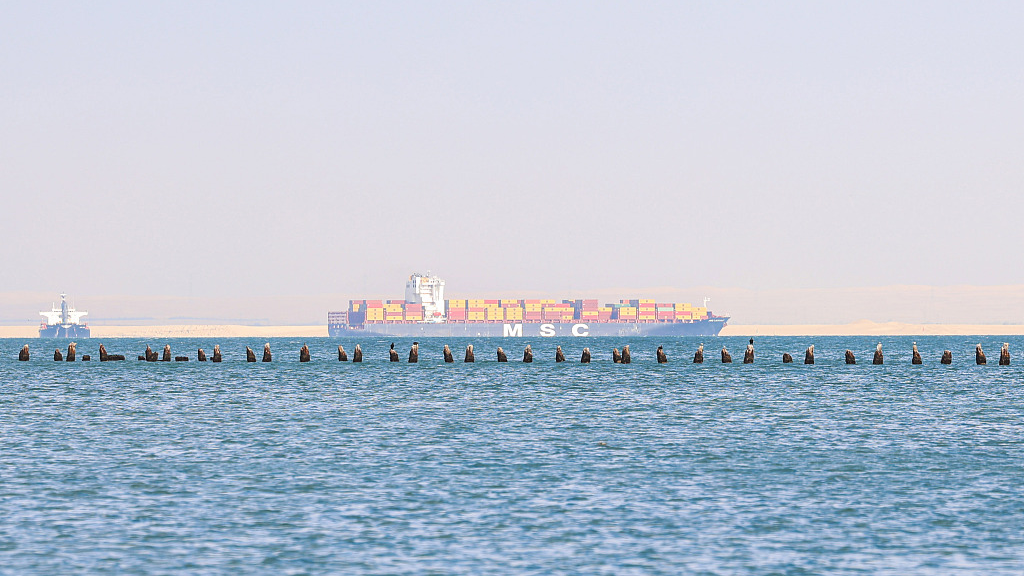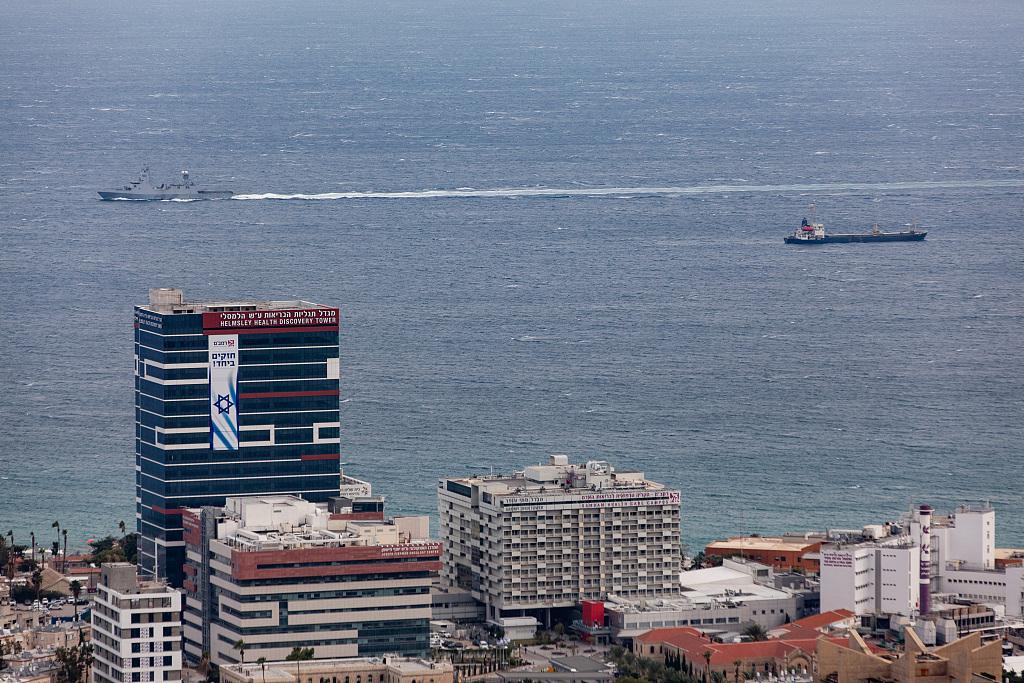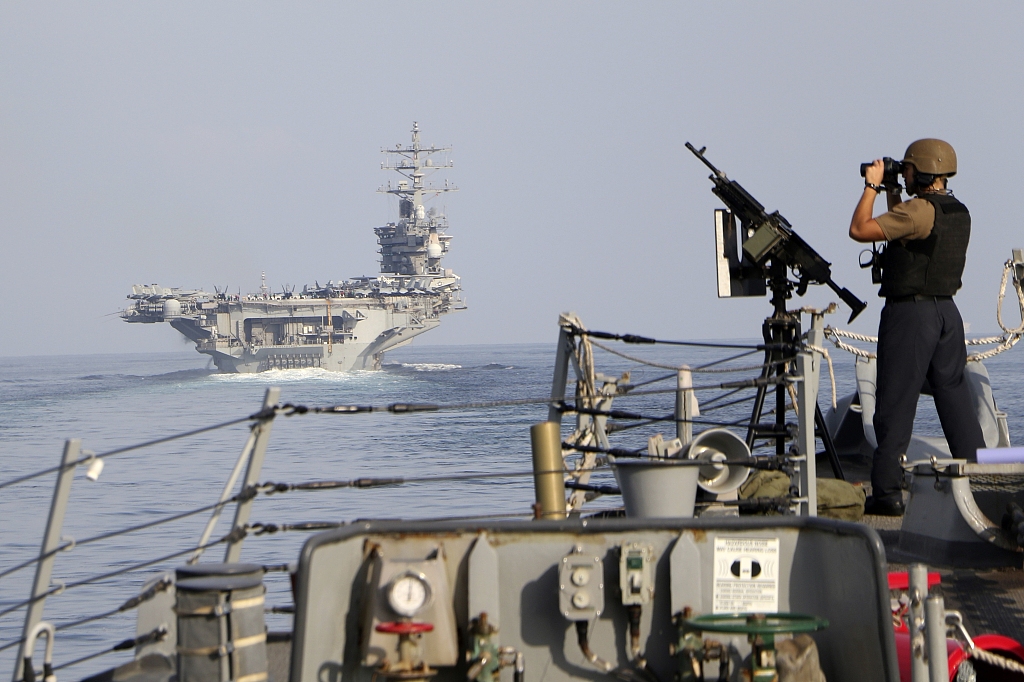
An MSC Mediterranean Shipping container ship sails southbound through the Great Bitter Lake in Ismailia. A steep decline in the number of tankers entering a vital Red Sea conduit suggests that attacks on ships in the area are further disrupting a key artery of global trade, Egypt, December 21, 2023. /CFP
Houthis, a militant group based in Yemen, are escalating their attacks on "Israel-related" ships in the Red Sea, demanding retribution for Israel's military campaign in Gaza.
During a televised speech on Wednesday, Houthi leader Abdulmalik al-Houthi said, "If the United States targets us, we will then retaliate by targeting U.S. battleships and interests in the region with our missiles, drones, and military operations."
This surge in tensions has prompted major shipping and oil companies to suspend transit through the critical maritime trade route, raising concerns about potential global economic repercussions. In response, the U.S. and more than 20 other nations formed a new coalition to safeguard ships navigating the Red Sea, the Pentagon said on Thursday.
However, the heightened military presence in the Red Sea, as analysts have argued, may stoke active hostilities, exacerbating concerns about the Israeli-Palestinian conflict spilling over into the region.

Commercial ships and an Israeli naval vessel are sailing in the Mediterranean Sea off the coast of northern Israel, following the U.S. announcement of its intention to form a multinational coalition to safeguard cargo ships traversing the Red Sea from attacks by the Houthi group, December 21, 2023. /CFP
Escalating tensions
Over the last four weeks, Houthis have attacked or seized commercial ships 12 times and still hold 25 members of the commercial ship Galaxy Leader hostage in Yemen.
The United States announced the multinational Red Sea coalition on Monday, while the Houthis warned two days later that they would strike back if attacked.
"We've had over 20 nations now sign on to participate" in the coalition, Pentagon spokesman Major General Pat Ryder told journalists.
Ryder said the Houthis are "attacking the economic wellbeing and prosperity of nations around the world," effectively becoming "bandits along the international highway that is the Red Sea," AFP reports.
Coalition forces will "serve as a highway patrol of sorts, patrolling the Red Sea and the Gulf of Aden to respond to – and assist as necessary – commercial vessels that are transiting this vital international waterway," he said, calling on the Houthis to cease their attacks.
U.S. Defense Secretary Lloyd Austin declared on Tuesday that Britain, Bahrain, Canada, France, Italy, the Netherlands, Norway, Seychelles, and Spain will participate in this joint U.S. mission. The collective efforts will involve collaborative patrols in the southern Red Sea and the Gulf of Aden.
In response, the Houthis said on Tuesday that the new U.S.-led military coalition in the Red Sea would not stop their attacks on Israel-bound commercial ships.
"The coalition formed by America is to protect Israel and militarize the sea without any justification," Houthi spokesman Mohammed Abdulsalam was quoted by the Houthi-controlled Saba news agency as saying.
"As America allowed itself to support Israel by forming an alliance, we also have full right to support Palestine," he said in a statement. "And whoever seeks to expand the conflict must bear the consequences of his actions."

The aircraft carrier USS Dwight D. Eisenhower and other warships cross the Strait of Hormuz into the Persian Gulf, as part of a wider American deployment in the Middle East amid the Israeli-Hamas conflict, November 26, 2023. /CFP
Wider conflict
The deployment of a U.S.-led military escort in the Red Sea has heightened concerns about a potential escalation of the Israeli-Palestinian conflict spilling over into the crucial waterway.
"The presence of U.S. warships alongside Israeli interests raises the possibility of unintended encounters with Houthi forces," said Salam Al-Asbahi, a retired general of the Yemeni government forces. He also noted Iran's support for both Houthis and Palestinian groups will potentially complicate the regional dynamics.
The U.S. on Friday accused Iran of close involvement in attacks on commercial ships by Yemen's Houthi rebels, stepping up the tone as Washington considers tougher measures including possible force, according to AFP.
The evolving landscape in the Red Sea is stoking anxieties among Middle Eastern nations, who fear the conflict could disrupt vital shipping routes and destabilize the region.
Moreover, both the Yemeni government and regional powers like Saudi Arabia and Egypt, despite their reliance on the Red Sea-Suez Canal route, hesitate to join the U.S. escort mission and directly engage with Houthis.
Al-Asbahi attributed this partly to Houthi rhetoric aligning with Arab public sympathy for Palestinians. "Their strong stance on the Palestinian issue resonates with many in the region, making it politically difficult for some countries to openly oppose them," he explained.
Further complicating the situation is the backlash among Arab countries against the U.S. policy on the ongoing Gaza conflict, making cooperation with the U.S. coalition less appealing.





